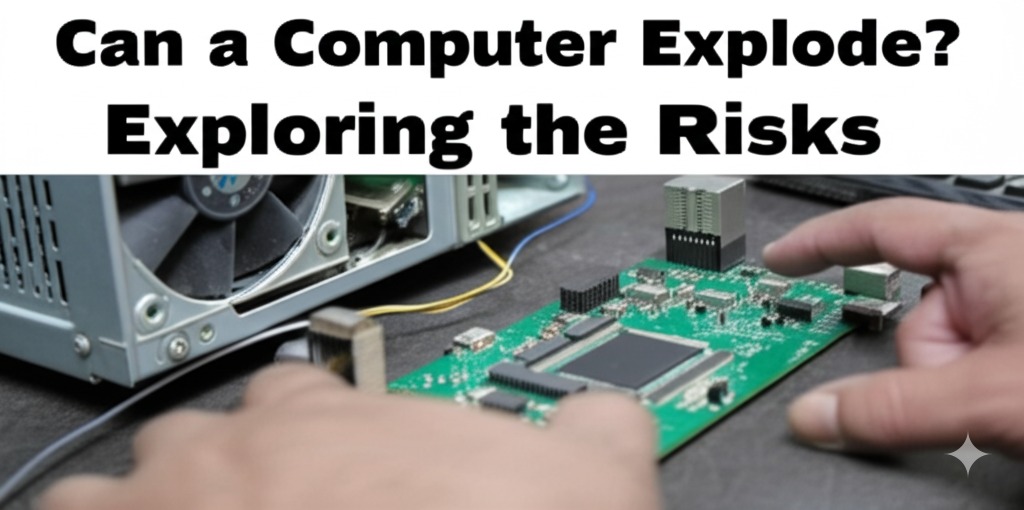Computers are integral to our daily lives, from work to entertainment and communication. But have you ever wondered, can a computer actually explode? While it may sound like the plot of a science fiction movie, the reality is that under certain conditions, a computer can experience serious malfunctions that could lead to explosions or fires. In this article, we’ll break down the factors that could cause a computer to explode, the dangers involved, and how to prevent such incidents.
What Could Cause a Computer to Explode?
The idea of a computer exploding might seem far-fetched, but several factors could make it a real possibility. These factors generally involve overheating, electrical issues, or battery malfunctions. Let’s explore the primary causes.
Overheating: A Silent Killer
Computers, especially laptops and high-performance desktops, generate a significant amount of heat during use. If this heat isn’t properly managed, it can cause the internal components to overheat. Overheating is one of the leading causes of malfunction and potential fire hazards in electronics.
- How It Happens: When components like the processor or graphics card get too hot, they can become damaged, potentially triggering sparks or melting of wires, which could lead to fire or explosion.
- Preventive Measures: Regularly clean your computer’s vents, use cooling pads for laptops, and ensure proper airflow. Installing temperature monitoring software can also help you keep an eye on your system’s health.
Faulty Power Supply Units (PSUs)
The power supply unit (PSU) is responsible for converting electrical energy from the outlet into usable power for your computer. If a PSU malfunctions, it could cause electrical sparks or even an explosion.
- How It Happens: PSUs that are poorly designed, improperly installed, or have degraded over time can fail. In extreme cases, a failed PSU might result in an electrical short, sparks, or even a fire.
- Preventive Measures: Choose high-quality PSUs from trusted manufacturers. Regularly check for warning signs such as system instability, unusual noises, or power surges.
Lithium-Ion Battery Failures in Laptops
Many modern laptops and mobile devices use lithium-ion (Li-ion) batteries, which are known for their high energy density. While they’re generally safe, they come with risks if damaged or improperly charged.
- How It Happens: If the battery is punctured, overcharged, or exposed to extreme temperatures, it can result in a thermal runaway, where the battery overheats and possibly explodes.
- Preventive Measures: Always use the charger provided by the manufacturer, avoid using your laptop while it’s charging on soft surfaces like a bed, and replace aging batteries.
Real-World Cases of Exploding Computers
While rare, there have been instances where computers or their components have exploded or caught fire. One well-known example is the Samsung Galaxy Note 7 battery recall in 2016, where overheating batteries led to devices catching fire or even exploding. Though it wasn’t a computer in the traditional sense, it highlighted the dangers associated with lithium-ion batteries.
Another example involves faulty PSUs in certain desktop systems, where overheating or electrical malfunctions have led to sparks and fires.
How Can You Prevent a Computer Explosion?
Knowing the risks is the first step toward ensuring your computer’s safety. Here are some simple and effective steps you can take to reduce the chances of an explosion or fire hazard:
Regular Maintenance and Cleaning
Dust accumulation inside your computer can obstruct airflow and cause overheating. Make it a habit to clean your device’s vents and fans at least once every few months to keep the system cool.
Invest in Quality Components
Whether you’re building a custom desktop or purchasing a laptop, always choose reputable brands known for their quality and reliability. Cheap or generic parts may be more prone to malfunction.
Avoid Overclocking
Overclocking can push your computer’s components beyond their intended limits, causing them to heat up quickly. If not monitored closely, overclocking can lead to hardware failures and overheating.
Use Surge Protectors
Electrical surges can damage your computer’s internal components. Plugging your system into a surge protector can help absorb any excess voltage, preventing damage to the power supply and motherboard.
Replace Aging Batteries
If your laptop battery has been in use for a long time or shows signs of swelling or leakage, replace it immediately. Most laptop manufacturers offer official battery replacement programs.
What to Do If Your Computer Overheats
If your computer is showing signs of overheating (such as excessive heat or shutdowns), here’s what you can do:
- Turn It Off Immediately: Shut down the system to prevent further damage.
- Check the Vents: Ensure that vents are not blocked by dust or obstructions.
- Move to a Cooler Environment: If possible, move the computer to a cooler room or use a cooling pad.
- Seek Professional Help: If the issue persists, it might be time to have a technician examine your computer.
Can Your Computer Really Explode?
While it’s unlikely that a typical consumer computer will explode under normal conditions, the potential for malfunctions leading to overheating, fires, or battery failures does exist. However, by taking proper care of your device, using quality parts, and adhering to safety guidelines, you can significantly reduce these risks.
Conclusion
So, can a computer explode? While it’s rare, the possibility exists under certain extreme conditions, such as overheating or battery failure. By following preventive measures and maintaining your computer regularly, you can keep it running smoothly and safely. If you haven’t already, make sure to check your system’s temperature, keep your hardware in good condition, and replace any aging components. Safety first!
If you found this article helpful, don’t forget to share it with others to help them understand the importance of computer safety. Stay safe, and keep your devices running at their best!

Caleb Carlson is a contributing writer at Computer Site Engineering, specializing in computer technology, software trends, and hardware innovations. His articles simplify complex tech topics, making them accessible to readers of all levels.





